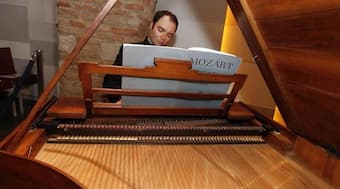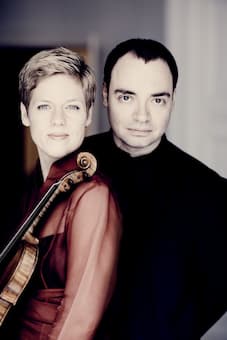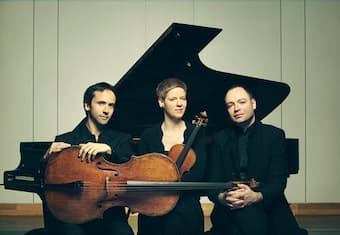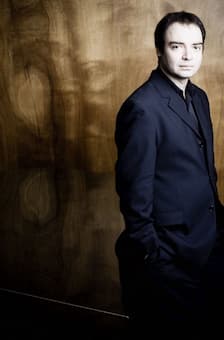
Alexander Melnikov © Molina Visuals
Born on 1 February 1973, the Russian pianist Alexander Melnikov began his musical studies at the Moscow Central Music School at the age of 6. Although he never considered himself a child prodigy, he did play Rachmaninoff’s first piano concerto at the age of 12. Melnikov continued his studies at the Moscow Tchaikovsky Conservatory under Lev Naumov, nicknamed the “Godfather of the Russian piano school.” Naumov had studied with the legendary Heinrich Neuhaus, and his studio produced some of the best-known Russian pianists in the past 40 years.
 During his formative musical years in Moscow, Melnikov considers his contact with Sviatsoslav Richter of fundamental importance, as “he taught him a great deal about combining power with subtlety.” After graduating in 1997, Melnikov took on post-graduate studies with Eliso Virsaladze in Munich, and he engaged with historically informed performance through his studies with Andreas Staier, and with Karl-Ulrich Schnabel in Como, Italy.
During his formative musical years in Moscow, Melnikov considers his contact with Sviatsoslav Richter of fundamental importance, as “he taught him a great deal about combining power with subtlety.” After graduating in 1997, Melnikov took on post-graduate studies with Eliso Virsaladze in Munich, and he engaged with historically informed performance through his studies with Andreas Staier, and with Karl-Ulrich Schnabel in Como, Italy.
Melnikov Plays Rachmaninoff Sonata No. 2

Alexander Melnikov and Isabelle Faust
During his student years, Melnikov won several major international piano competitions, including the Schumann Piano Competition in Zwickau in 1989 and the Queen Elisabeth Music Competition in Brussels in 1991. His international career has seen him appear in numerous International Music Festivals around the world, and the same is true of his activities as a recitalists. He has made concerto appearances with orchestras such as the Russian National, Tokyo Philharmonic, Gewandhausorchester Leipzig, Philadelphia Orchestra (under Charles Dutoit), Rotterdam Philharmonic Orchestra (under Valery Gergiev), Royal Concertgebouw Orchestra, NHK Symphony Orchestra and BBC Philharmonic Orchestra. As Bavarian Radio reported, ”His playing is always refined, yet resolutely committed. His great achievement is to be simultaneously conspicuous and discreet, both sensitive and full of character.”
Melnikov Plays Scriabin

Faust/Melnikov/Queyras
Chamber music has always been an important part of Melnikov’s performing activities. Between 1993 and 2003 he performed with violinist Vadim Repin, and he frequently appears with violinist Isabelle Faust, and cellist Jean-Guihen Queyras. For several years, Melnikov refused to perform the Russian Romantics, and it took some convincing from Mikhail Pletnev to reignite his interest in that repertoire. He has since made deeply insightful and much praised recordings of Rachmaninoff and Scriabin for Harmonia Mundi. His association with the label arose through his regular recital partner, violinist Isabelle Faust, and in 2010 their complete recording of the Beethoven’s sonatas for violin and piano won both Germany’s ECHO Klassik prize and a Gramophone Award, and was nominated for a Grammy. A critic wrote, “Melnikov is an exceptionally modest and self-critical artist whose abilities are entirely at the service of the music; he prefers to avoid any cult of the personality. He commands the classic Russian technique that enables him to rise to virtuoso challenges, but his thoughtful musicianship defies easy classification.”
Faust/Melnikov/Queyras: Beethoven “Archduke Trio”
 Alexander Melnikov discovered his interest in historically informed performances at an early age. In a number of recordings he has featured pianos appropriate to the composer and the period. That includes an 1885 Érard piano for his recording of the Franck Violin Sonata, and the 1828 Graff fortepiano for Schubert’s “Wanderer.” In one of his recent performing projects, Melnikov plays four pieces performed on four different pianos. A critic wrote, “This idea of juxtaposing different pianos is a fascinating concept, but luckily it is more than just a gimmick. After the initial surprise of the varying timbres of each instrument, you soon forget about such technical considerations and become drawn in to the actual interpretations, all four of which are dazzling and highly recommended.” Melnikov’s playing has been described as wonderfully colourful and imaginative. “His pianissimi are astonishing, with long, meticulously nuanced passages often remaining very, very quiet, while, in the sculpted fugues, the intensification of volume runs to a purposeful plan… Everything is testament to reflection and skill, yet the pianist is not lecturing, but laughing, dreaming, lamenting and dancing.” We very much look forward to the next projects of the “Man with Many Pianos.”
Alexander Melnikov discovered his interest in historically informed performances at an early age. In a number of recordings he has featured pianos appropriate to the composer and the period. That includes an 1885 Érard piano for his recording of the Franck Violin Sonata, and the 1828 Graff fortepiano for Schubert’s “Wanderer.” In one of his recent performing projects, Melnikov plays four pieces performed on four different pianos. A critic wrote, “This idea of juxtaposing different pianos is a fascinating concept, but luckily it is more than just a gimmick. After the initial surprise of the varying timbres of each instrument, you soon forget about such technical considerations and become drawn in to the actual interpretations, all four of which are dazzling and highly recommended.” Melnikov’s playing has been described as wonderfully colourful and imaginative. “His pianissimi are astonishing, with long, meticulously nuanced passages often remaining very, very quiet, while, in the sculpted fugues, the intensification of volume runs to a purposeful plan… Everything is testament to reflection and skill, yet the pianist is not lecturing, but laughing, dreaming, lamenting and dancing.” We very much look forward to the next projects of the “Man with Many Pianos.”
For more of the best in classical music, sign up to our E-Newsletter
Melnikov Plays Schuman Piano Concerto
